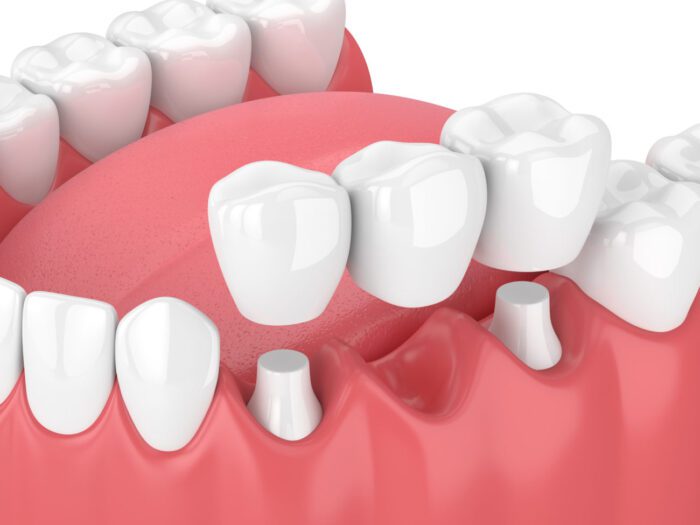A dental bridge will restore the appearance and partial function of a smile for those missing multiple consecutive teeth. It can also replace a single missing tooth. This popular dental restoration is made to ‘bridge’ the gap when teeth are missing. Bridges restore both function and aesthetics to patients’ smiles. They can also help to maintain patients’ overall oral health. Dr. David Weinstock is an excellent restorative dentist in Bala Cynwyd, PA and offer bridges.

If you suffer from one or a few missing teeth, a dental bridge can improve your confidence and quality of life. A bridge will help maintain the natural shape of your face, close the gaps in your smile, and allow you to chew food normally. They are made of high-quality dental materials that will look just like natural teeth.
There are several types of dental bridges for you to choose from. Dr. Weinstock will examine your teeth and overall oral health. He can then help you determine which missing tooth replacement option is best for you and your lifestyle, cosmetic goals, and oral health.
Types of Dental Bridges
There are multiple types of dental bridges that may be used to restore your smile based on individual needs. Continue reading to learn about the different types of dental bridges and how each can benefit your smile.
Traditional Dental Bridge
A traditional dental bridge can replace one to four consecutive missing teeth. It is made up of two dental crowns that are on both ends. The pontics, or the false teeth, are in the middle. Your dentist will need to prepare two adjacent teeth to secure the bridge. Then he will cement the crowns to those teeth. A traditional dental bridge is secured by surrounding teeth on either side.
Cantilever Bridge
Similar to a traditional bridge, a cantilever bridge will attach to an adjacent tooth. Your dentist will use this when only one healthy tooth is available to secure the bridge. Since it is only attached to one tooth, it is not as secure as a traditional bridge. Additionally, these bridges may have a shorter lifespan than traditional bridges because they are only secured to one tooth.
Maryland Bridge
A Maryland bridge is made up of a metal framework and pontics. It has metal wings that your dentist will bond to the backside of the neighboring teeth. To qualify for this type of bridge, you must have good oral hygiene and the adjacent teeth must be healthy. We will inspect your oral hygiene and the stability of your teeth before considering you to be a good candidate for a Maryland Bridge.
Dental Implant-secured Bridge
Your dentist can secure a dental bridge with dental implants. A dental implant-secured bridge will provide added oral health benefits such as bone retention and prevention of possible tooth shifting. We recommend securing bridges with implants often, because of the added benefits that implants offer.
Implant-secured bridges do not require damaging surrounding healthy teeth and can help support a stable and durable oral foundation. Additionally, dental implants promote continued bone growth, preventing both bone shrinkage and gum recession associated with traditional bridges and dentures. They also last longer than traditional bridges and function very similarly to natural teeth. Dr. Weinstock provides comprehensive dental implant services for convenience and consistent results.
If you choose dental implants to secure your bridge, your dentist will create a custom treatment plan for you. This will involve surgical implantation of the implant post and the placement of a temporary bridge. After a 3 to 6 month healing period, you will return to our Philadelphia dentist’s office for the permanent placement of your dental bridge.
Receiving a Dental Bridge in Philadelphia, PA
A bridge is a set of prosthetic teeth that link together. Your dentist will use this custom-made device to replace a missing tooth or teeth by anchoring it to neighboring teeth, referred to as the anchor or abutment teeth, on one or both sides.
When you replace a lost tooth with a bridge, your dentist will need to prepare the anchor teeth on either side. This is similar to how they would prepare a tooth for a dental crown. It involves significantly reducing the size of the teeth. The preparation of these teeth allows us to create sufficient space to accommodate the materials needed to serve as abutments to hold the prosthetic (replacement) tooth in place. It also allows us to create a surface that the prosthetic tooth will attach to and firmly hold the bridge in place.
Once your anchor teeth are prepared, your dentist will take several impression of your teeth. These are used to create your permanent dental restoration as well as your temporary bridge. You will wear the temporary restoration until your final one is ready. This process typically takes less than a month. Once we receive it, we will cement it to your prepared anchor teeth for a secure fit.
What type of Material is a Dental Bridge Made of?
A dental bridge is often made from superior materials such as semiprecious or precious metals, porcelain, or a fused combination of the two materials and ceramic material. The metal substructure serves to give the bridge its strength and the porcelain permits us to achieve excellent aesthetics. These materials may be matched to the exact color, shape, ad size of your natural teeth to ensure that they blend in seamlessly with the rest of your smile.
Beauty, function, and tissue compatibility are important to consider when selecting the material most suitable for you. Your dentist will carefully fit the bridge on to the prepared teeth. The bridge will fit under the gum tissue to hide the junction between the tooth and the bridge. Your dentist will secure the bridge in place using special adhesive dental cement.
The goal of this procedure is for the final bridge to look as natural as possible and feel like your own teeth. All-ceramic bridges are now an option for treatment. They have a substructure made of a material called Zirconia. The Zirconia has the strength of metal. Your dentist will use it as a substitute for conventional porcelain fused to metal bridges.
Dental Bridge FAQs
Do you have further questions about dental bridges and how they can restore your smile? Continue reading to learn more and find answers to frequently asked questions in our office.
Can I replace a traditional bridge with an implant-supported bridge?
Yes, it is possible to replace your old dental bridge with an implant-supported bridge. There are not many requirements you have to meet to be eligible, but you should have a healthy oral foundation to start. We will conduct a thorough dental exam prior to recommending an implant-supported bridge and other treatment options.
When is a good time to replace a dental bridge?
You should replace your dental bridge if it does not fit like it used to. Visit your dentist if it’s wiggling too much, causing you gum irritation, is hard to keep in place, and is uncomfortable to eat while wearing it. An ill-fitting bridge can cause more harm to your neighboring teeth.
Can you whiten teeth on a dental bridge?
White strips, gels, and traditional teeth whitening at the dentist do not have any effect on dental bridges. Dental bridges and other artificial restorations are made of stain-resistant material that can not change color. You can prevent stains from forming on your bridges with a diligent oral health routine. We can replace your old dental bridges with modern color-matched ones.
Will my dental bridge be noticeable?
With today’s dental technology, we can design a dental bridge that will blend in perfectly with your smile. We will ensure that the restoration matches the shape, color, and alignment of your surrounding teeth. This will make your dental bridge difficult to notice when smiling.
Will a dental bridge affect how I eat or speak?
For the most part, a dental bridge should not affect how you eat or speak. However, you may experience an adjustment period after having the dental bridge placed. A properly fitted and placed dental bridge will actually help most patients with their speech and eating patterns. A dental bridge will allow for comfortable and functional use of the replaced teeth.
Schedule an Appointment for a Dental Bridge in Philadelphia, PA
If you suffer from missing teeth, we can provide you with a custom dental bridge in Philadelphia, Pa. Please call (215) 857-8054 to book an appointment or you can also request an appointment online by filling out the form.
